|
|
|
Sort Order |
|
|
|
Items / Page
|
|
|
|
|
|
|
| Srl | Item |
| 1 |
ID:
135406
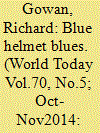

|
|
|
|
|
| Summary/Abstract |
UN peacekeepers are being killed in several conflict zones and need the world's support.
|
|
|
|
|
|
|
|
|
|
|
|
|
|
|
|
| 2 |
ID:
097411
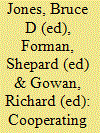

|
|
|
|
|
| Publication |
Cambridge, Cambridge University Press, 2010.
|
| Description |
xv, 332p.
|
| Standard Number |
9780521889476, hbk
|
|
|
|
|
|
|
|
|
|
|
|
Copies: C:1/I:0,R:0,Q:0
Circulation
| Accession# | Call# | Current Location | Status | Policy | Location |
| 055047 | 341.2/JON 055047 | Main | On Shelf | General | |
|
|
|
|
| 3 |
ID:
154208
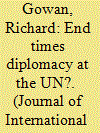

|
|
|
|
|
| Summary/Abstract |
It is hard to write analytically or even clearly about diplomacy at the United Nations over the last six months. Donald Trump’s triumph in the U.S. elections plunged the UN, like most of the rest of the world, into a state of fractious chaos. For eight years, the Obama administration had invested in the institution as a mechanism for both solving immediate crises like the war in South Sudan and long-term threats like climate change. Now all that grinding work appeared vulnerable to Trump’s whims. He was dismissive of the UN on the campaign trail and few diplomats and international officials doubted that he would escalate his attacks once in office.
|
|
|
|
|
|
|
|
|
|
|
|
|
|
|
|
| 4 |
ID:
108956
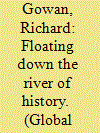

|
|
|
| 5 |
ID:
107839
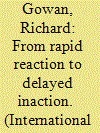

|
|
|
|
|
| Publication |
2011.
|
| Summary/Abstract |
In 2008, the UN faced a military and humanitarian crisis in the eastern Democratic Republic of Congo and asked the EU to send a rapid-reaction force to help stabilize the situation. The EU failed to do so. This article analyses the immediate circumstances and consequences of this non-deployment. It also identifies longer-term flaws in the EU-UN relationship which contributed to European inaction in this crisis. The article argues that the events of 2008 meant that over-inflated expectations of European rapid-reaction capabilities have been replaced with an assumption that the EU is no longer a significant military player in sub-Saharan Africa. Studying this 'non-event' provides a clearer understanding of the wider EU-UN relationship than can be derived from studying examples of successful inter-institutional cooperation alone.
|
|
|
|
|
|
|
|
|
|
|
|
|
|
|
|
| 6 |
ID:
158460
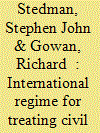

|
|
|
|
|
| Summary/Abstract |
The post–Cold War international order has promoted a “standard treatment” for civil wars involving the use of mediation to end conflicts and the deployment of peacekeeping forces to implement the resulting settlements. The United Nations has played a leading role in applying this standard treatment, which enjoys broad international support. By contrast, Western efforts to promote more robust humanitarian intervention as a standard response to civil wars remains controversial. While effective in relatively permissive postconflict environments, international mediation and peacekeeping efforts have proved insufficient to resolve harder cases of civil war, such as those in South Sudan and Syria. The UN has struggled to make the standard treatment work where governments refuse to cooperate or low-level violence is endemic. Growing major-power tensions could now undermine the post–Cold War regime for the treatment of civil wars, which, for all its faults, has made a significant contribution to international order.
|
|
|
|
|
|
|
|
|
|
|
|
|
|
|
|
| 7 |
ID:
117795
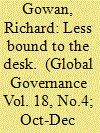

|
|
|
|
|
| Publication |
2012.
|
| Summary/Abstract |
WHAT SORT OF DIPLOMATIC STRATEGIST IS BAN KI-MOON? SINCE BAN TOOK
office as Secretary-General of the United Nationsin 2007, there has been a
great deal of discussion about his personal diplomatic style. Until the Arab
Spring, he was typically characterized as an archetypal (though not always
effective) quiet diplomat. In January 2011, Human Rights Watch accused
Ban of having an "undue faith in his professed ability to convince by private persuasion" when dealing with repressive governments in cases such
as Myanmar, Sudan, and Sri Lanka.
1
As I argued in a previous article for
Global Governance, Ban's belief in diplomacy meant that he took too little
interest in peacekeeping during his first term leading the UN.
2
Since the
beginning of the Arab Spring, however, Ban appears to have lost some of
hisfaith in diplomatic niceties. He spoke out early in favor of the protestors
in Egypt, became a consistent supporter of military action in Libya, and
publicly condemned the Syrian regime's violence against civilians as early
as May 2011.
3
Asthe Syrian crisis deteriorated in 2012, Ban appointed first
his predecessor, Kofi Annan, and later the stalwart UN mediator Lakhdar
Brahimi as envoys to Damascus but repeatedly escalated his own criticism
of President Bashar Al-Assad.
|
|
|
|
|
|
|
|
|
|
|
|
|
|
|
|
| 8 |
ID:
131286
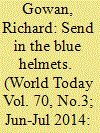

|
|
|
| 9 |
ID:
083191
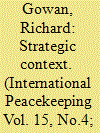

|
|
|
|
|
| Publication |
2008.
|
| Summary/Abstract |
There is a consensus that the UN needs a stronger strategic culture, but its strategic circumstances militate against this. Since 2006, the UN has struggled with a series of crises that have overshadowed efforts to develop the idea of integration. It also faces a systemic crisis, in that its framework for deploying missions has been undermined in Darfur. In addition it faces a paradigmatic crisis, as many of its assumptions about transitions from war to peace have been shown wanting in cases from Afghanistan to the Democratic Republic of Congo. At a time of increasing rivalry among major powers, not least in the Security Council, the UN may not develop comprehensive strategies aimed at transforming post-conflict societies. But it may be able to achieve more limited but politically credible goals
|
|
|
|
|
|
|
|
|
|
|
|
|
|
|
|
| 10 |
ID:
081567
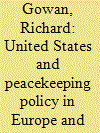

|
|
|
|
|
| Publication |
2008.
|
| Summary/Abstract |
Reviewing US policy towards peacekeeping in Europe and Latin America since the early 1990s, this article addresses how far the United States dictated the terms on which it engaged in peace operations, and the extent it could decide the terms on which its allies participated in those operations. During the Clinton era, the United States encountered significant operational challenges, but this was the tactical price of strategic success, as its engagement in peace operations contributed to a transformation of its alliances in Europe (although there was no comparable process in Latin America). The Bush administration took a negative view of peace operations, but European and Latin American governments continued to see them as proof of their strategic relevance, European forces deploying in Afghanistan and Lebanon. But US allies frequently aim to demonstrate their autonomy - sometimes placing this political goal over operational efficiency - and the resulting tensions have had a significant impact on missions
|
|
|
|
|
|
|
|
|
|
|
|
|
|
|
|
|
|
|
|
|